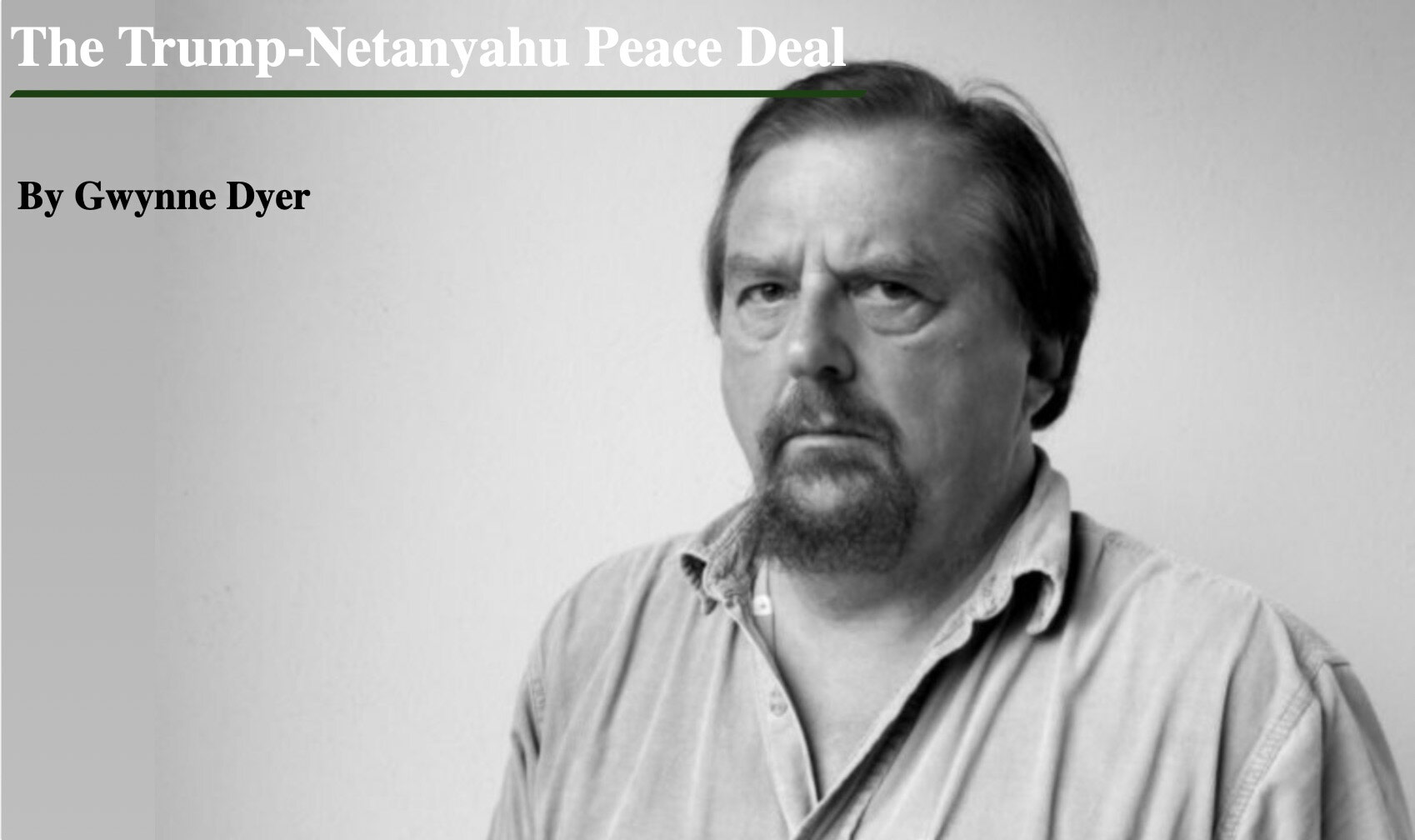The Trump-Netanyahu Peace Deal
Gwynne Dyer
The peculiar thing about the ‘peace deal’ between Israelis and Palestinians that was announced in Washington on Tuesday was obvious at a single glance.
There was President Donald Trump and his good buddy Binyamin Netanyahu, the Israeli prime minister, together at the podium, and an audience of US and Israeli officials who clapped at every opportunity. They were talking about a ‘two-state solution’, and one of those states would have to be Palestinian – but there wasn’t a single Palestinian in the room.
The after-life of the ‘two-state’ principle has already been much longer than its real life. It was born in the Oslo Accords of 1993, which were based on the belief that, although Israel had conquered all of historic Palestine by 1967, it could not go on ruling over millions of Arabs forever.
Peace and prosperity could only come, therefore, if the Palestinians had their own state, too. So the Oslo principle was that there should be two equal and democratic states living side by side, one Israeli and one Palestinian: the ‘two-state solution’. But that solution didn’t even survive the 20th century.
Yitzhak Rabin, the Israeli prime minister who signed the Oslo deal, was assassinated by a Jewish right-wing extremist in 1995. His successor, ‘Bibi’ Netanyahu, had strangled the deal in its cradle before his first term as prime minister ended in 1999.
The Oslo Accords died because Palestinian nationalists didn’t want to accept a state that included only one-sixth of former Palestine, and Israeli nationalists didn’t see why the Palestinian Arabs should have even that much land. Indeed, since the whole area was controlled by the Israeli military, Jewish settlers were already building towns throughout the occupied zone.
Yet even two decades later, almost nobody admits publicly that the two-state solution is long dead, because to say that commits you to a discussion of the remaining alternatives – and none of them are good. That’s why even this bizarre sham ‘deal’, cooked up by Trump and Netanyahu without any Palestinian participation, still talks about two states.
At every turn of the wheel, the size of the imaginary state on offer to the Palestinians dwindles. With Israel on the brink of formally annexing all the Jewish settlements in the occupied West Bank, it’s down to about 10% of former Palestine, and it will never actually happen. Yet the fictional destination of a Palestinian state must still be maintained. Why?
When people saw the ‘concept’ of a Palestinian state unveiled by Trump’s son-in-law Jared Kushner, consisting of several dozen little enclaves linked by overpasses and tunnels, many were irresistibly reminded of the ‘Bantustans’ of South Africa.
The Bantustans were created by the apartheid regime to give the illusion of freedom and self-determination for South Africa’s oppressed black populations. They never fooled anybody, but they allowed the regime to claim that it did respect the democratic rights of black people. They just couldn’t vote in South Africa, which was a country for white people.
Kushner’s map is trying to do the same trick.
A real two-state solution is politically unsaleable in Israel, partly because of the Jewish majority’s security concerns but mainly because the Jewish settlers want too much of the territory such a Palestinian state would be built on.
But the Palestinians are not going to go away, and there are around five million of them. They have already lived under Israeli military rule for more than fifty years. Can you really defend leaving them under military occupation for another fifty?
If not, then the remaining alternatives are a two-state solution or a ‘one-state solution’ in which Israel annexes all the occupied territories. But if Israel annexes them, then those five million Palestinian Arabs will be able to vote in Israeli elections – and Israel ceases to be a ‘Jewish state’, although it remains a democratic one.
Or else you don’t let them vote, in which case Israel becomes an apartheid state. This is why the zombie two-state solution keeps rising from its grave. Israel doesn’t actually have to get the Palestinians to agree, but it must keep talking about some sort of Palestinian state or else resign itself to being simply an ethnic tyranny.
Is this a sustainable long-term policy? It may well be. Israel is the regional military superpower, unbeatable by any imaginable combination of Arab states and, in any case, the rest of the Arab world has largely lost interest in the plight of the Palestinians.
That’s why there was no need to have any Palestinians at the great unveiling of the Trump-Netanyahu ‘peace deal’ this week. Palestinian consent is not necessary, and when they reject it they can be vilified for rejecting ‘peace’. Netanyahu understands this perfectly. Whether Trump understands it doesn’t even matter.
Gwynne Dyer’s new book is Growing Pains: The Future of Democracy (and Work).
Or to read more Gwynne Dyer, subscribe to the West Quebec Post! Call today: (819) 684-4755, ext 0.





